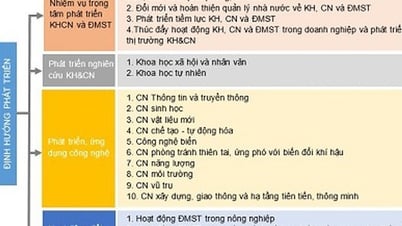The 2025 high school graduation exam in Math and English is attracting attention and debate among experts, teachers, students and parents. Some say the exam is too difficult and puzzling; others support the new way of writing the exam. VietNamNet opens a forum to record diverse opinions, contributing to improving the exam and enhancing the quality of teaching and learning.
The following article is a professional analysis of the 2025 High School Graduation English exam by Dr. Vu Thi Phuong Anh, former director of the Center for Testing and Training Quality Assessment, Ho Chi Minh City National University.
What makes a test "difficult", "interesting" or "good"?
A test is considered “difficult” when the majority of candidates do not achieve the average score - this can only be determined after the actual score distribution. However, the reactions of students and teachers, along with experience in recent years, suggest that the average score this year will likely be lower, ranging from 4.5 to nearly 5 points - with not many 9s and 10s. If this prediction is correct, the test can be considered difficult.
The concept of “good” is subjective, often used by many people to describe positive feelings about the exam - perhaps because the language is current, interesting or close. But “good” for one person is not necessarily “good” for another, and that is not a professional criterion for evaluating the exam.
Because the test is a measuring tool based on objective standards, not a novel, it cannot be evaluated based on the standard of "good". But if "good" is understood as another way to express the meaning of "good", then a test is considered "good" when it satisfies the following criteria: Correctly assesses the capacity to be measured; is suitable for the subject and objectives of the test; is feasible in real conditions; is clear, transparent, easy to understand and easy to grade.
Applying the above criteria to the Vietnamese high school graduation exam, we see that the goal and object of the exam is to assess the ability to use English in daily life at level B1 and is intended for students who have completed the generaleducation program. Because this is an exam with a dual purpose of both assessing the achievement of the minimum competencies of the program and selecting excellent university candidates, the exam questions not only aim to assess the achievement of the minimum competencies of candidates according to the objectives of the study program but also need to be differentiated.

Positive new points: Towards real capacity assessment
Compared with previous years, this year's exam shows some bright spots:
Increased authenticity: The material is close to everyday communication situations, helping students apply language in meaningful contexts.
Focus on skills instead of knowledge: Reading comprehension, logical reasoning, and main idea questions appear more often, demonstrating an orientation towards assessing language proficiency instead of mechanical memorization.
Language diversity: Skills such as scanning, skimming, coherence and cohesion in writing are emphasized.
Updated content: Current, scientific , and social topics create a sense of closeness, guiding students to expand their knowledge beyond language.
This is a positive step, approaching the modern assessment direction, especially if placed in the trend of educational innovation.
The big issue lies in difficulty and suitability.
However, a “good” exam does not only stop at being modern, but also needs to be suitable for the goals and subjects. A comparison between the sample exam (for reference) and the official exam this year shows some notable differences:
More suitable and feasible sample questions: Reading passages such as “Making friends in the sky” or “To save the planet…” have closer content, simpler writing style, suitable for high school students. The level of differentiation is moderate, ensuring that most students can do the basic part.
The official test exceeds the threshold: The reading passage about "Greenwashing" contains many difficult concepts such as decarbonisation, capital outlay..., requiring a knowledge base beyond the textbook. Some highly academic passages, complex sentence structures are overwhelming.
Interfering questions, requiring high reasoning: Many questions have closely spaced interference options, complex question formulation, requiring advanced paraphrasing and reading comprehension skills - which are not common with most 12th graders.
Disproportionate time pressure: With such difficulty, 50 minutes is too short. This makes it difficult for candidates to demonstrate their true abilities, especially when they are stressed when facing unfamiliar questions.
When a new direction lacks a suitable roadmap
The high school graduation exam, whose main purpose is to assess the minimum standard of students nationwide, cannot be considered a good exam, although it has many new positive points and is considered by many people to be "good". There are many objective grounds to believe that the language of the exam exceeds the required target (many language elements are at B2 level while the target is B1) and the content of the exam has many points that are too unfamiliar and go beyond the educational program.
The argument that "if the exam is difficult, it's okay for everyone" is only partly true if we see the exam as simply a competition to select candidates for university. Meanwhile, it is important to remember that the main purpose of the graduation exam is to assess the minimum standard of students nationwide. When the exam is too difficult, most students cannot do well, leading to the inability to determine whether they have met the minimum requirements. This loses the core meaning of a graduation exam, which is supposed to be a measure of the basic knowledge and skills that all students need when leaving school. And even when considering the purpose of using it as an entrance exam, giving a test that is too difficult compared to the educational goals is never encouraged from a professional perspective.
Need to balance innovation and relevance
The 2025 High School Graduation English Test is a remarkable effort to improve testing and assessment. However, there is still a big gap between the orientation and the actual implementation. If we only look at innovation and ignore feasibility and suitability, the test will unintentionally become a barrier, instead of a tool to promote learning.
Therefore, to have a “good” exam - in the sense of a “good” exam, there needs to be a balance between the goal of classifying and assessing minimum competence, between innovation and suitability to practical conditions. In particular, setting out a suitable roadmap for change, taking into account the adaptability of students and teachers, while strictly controlling the difficulty of the materials and questions, will help the high school graduation exam to maximize its role, both as an accurate assessment tool and as a promoter of the quality of English teaching and learning nationwide.
Source: https://vietnamnet.vn/de-thi-tieng-anh-tot-nghiep-thpt-2025-kho-vuot-ngoai-chuong-trinh-giao-duc-2416763.html





































































































Comment (0)